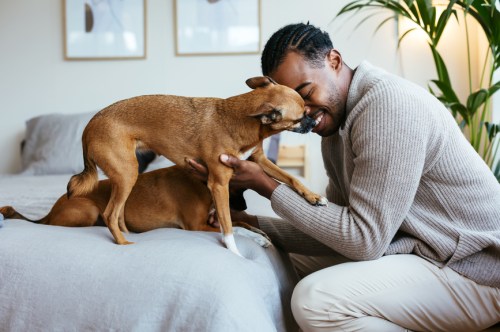Luxury shampoos, plant-based conditioners, daily supplements for healthy skin, nails, and teeth—pet grooming has undoubtedly gotten a wellness makeover. Another thing to add to your fur babies’ wellness toolkit: chiropractic adjustments. Yes, animal chiropractors are a thing, and they can help animals live their happiest and healthiest lives. Below, Morgan Olson, DC, a licensed chiropractor and certified animal chiropractor, explains what animal chiropractors do, the benefits of working with them, and when to take your pet to one.
What do animal chiropractors do?
“When trauma, toxins, and even thoughts become too much for the body to be able to perform normal bodily functions, we find motion restrictions in the spine,” Dr. Olson explains. “Animal chiropractors help connect the brain back to the body by removing any interference that may be impeding on those nerves exiting the spine which control movement, digestion, and all cell function in the body.” So, restoring proper motion to the vertebral column helps improve the body’s innate ability to heal itself.
The result? Improved well-being for your furry friends. “We see them sleep better, move better, heal faster, eat and digest better, experience less allergies, and improved immune function,” Dr. Olson says. “I’ve seen animal chiropractic help with injuries, speed up recovery, give years back to senior dogs with arthritic changes, and—the coolest of them all—help newborn animals nurse when they can’t on their own due to birth trauma.”
Dr. Olson recommends animal chiropractic care for all animals, especially horses and dogs due to their increased use in sport and animal work. She points out that, like humans, these animals can sustain injuries during sport. “Horses who jump, rodeo, cross country, dressage, and many more disciplines often utilize chiropractic,” she says. “Same goes for sport dog events such as dock diving, agility, and conformation show dogs.”
To be clear, Dr. Olson notes that animal chiropractic work is not a replacement for veterinary medicine, but the two disciplines can work together to enhance an animals’ overall health and well-being. And in case you were wondering, no, it’s not painful for the animal. “Just like human chiropractic adjustments, they can be tender in spots that are inflamed, but no, it doesn’t hurt them,” Dr. Olson says. “It’s just like when someone pokes your sore spots.”
When you should take your pet to an animal chiropractor
Chiropractic care is not just for sick animals. It also serves as preventative care. Specifically, though, Dr. Olson recommends taking your pet to an animal chiropractor whenever you notice changes in behavior (eating, mood, bowel/bladder), pain, limping, weakness, or sensitivity to touch. If the animal holds its head low or doesn’t want to do its usual activities (running, jumping, stretching after getting up, etc.), those are also signs to see an animal chiropractor. Basically, if you notice anything that is abnormal, the animal will likely benefit from an adjustment.
Dr. Olson advises searching for a certified animal chiropractor near you via the American Veterinary Chiropractic Association or the International Veterinary Chiropractic Association. She suggests opting for an animal chiropractor who has attended Animal Chiropractic Education Source for schooling because the training is neurologically based. She also notes that laws differ from state to state, and some may require vet referrals or supervision for animal chiropractic care.
During the first session, Dr. Olson says an animal chiropractor will examine the animal, perform an adjustment, and suggest a treatment plan based on its individual needs and problems. After an adjustment, you’ll quickly notice signs of relief in the animal. “In horses, we will see them lick, chew, yawn, lower their head, shake their head and body, and become sleepy,” Dr. Olson says. “Dogs are very similar, but we tend to look for a full-body shake post-adjustment. This lets us know we cleared their system.”
Dr. Olson adds that generally post-adjustment, all animals will move better, have more energy, and likely require a good nap afterward. “Rest is always a good sign that the body wants to use the newly connected nervous system to reset,” Dr. Olson says. “We heal the most when sleeping.” What’s true for humans is, in this case, true for our animal friends as well.
Sign Up for Our Daily Newsletter
Get all the latest in wellness, trends, food, fitness, beauty, and more delivered right to your inbox.
Got it, you've been added to our email list.











